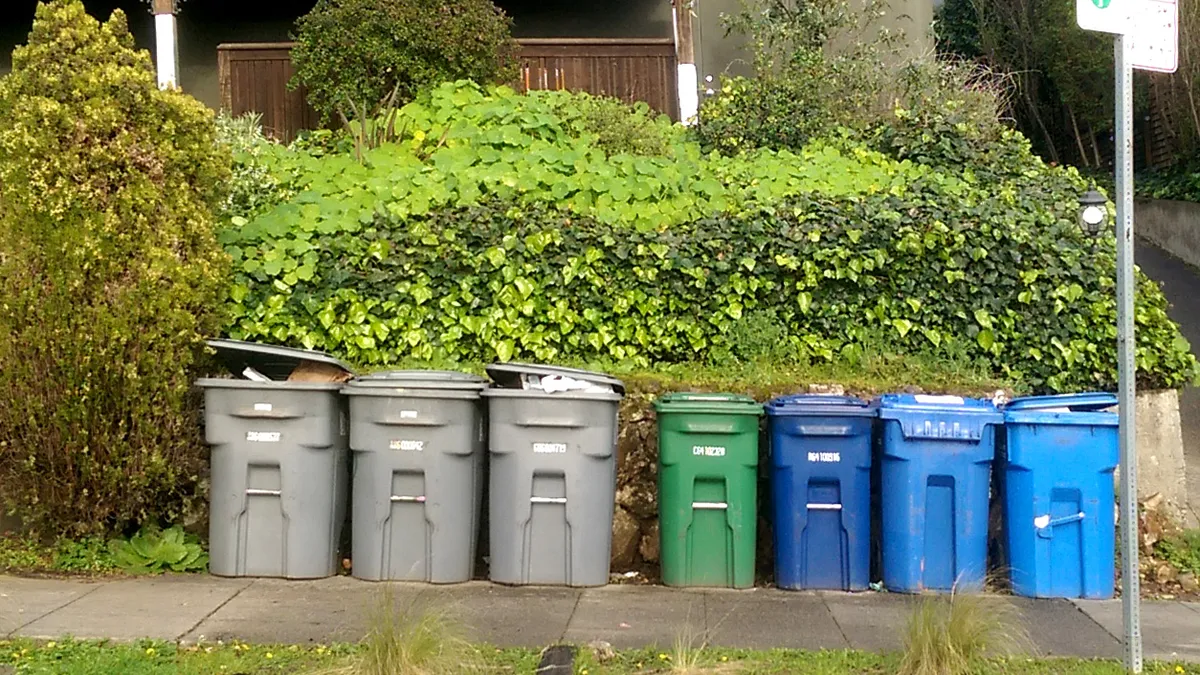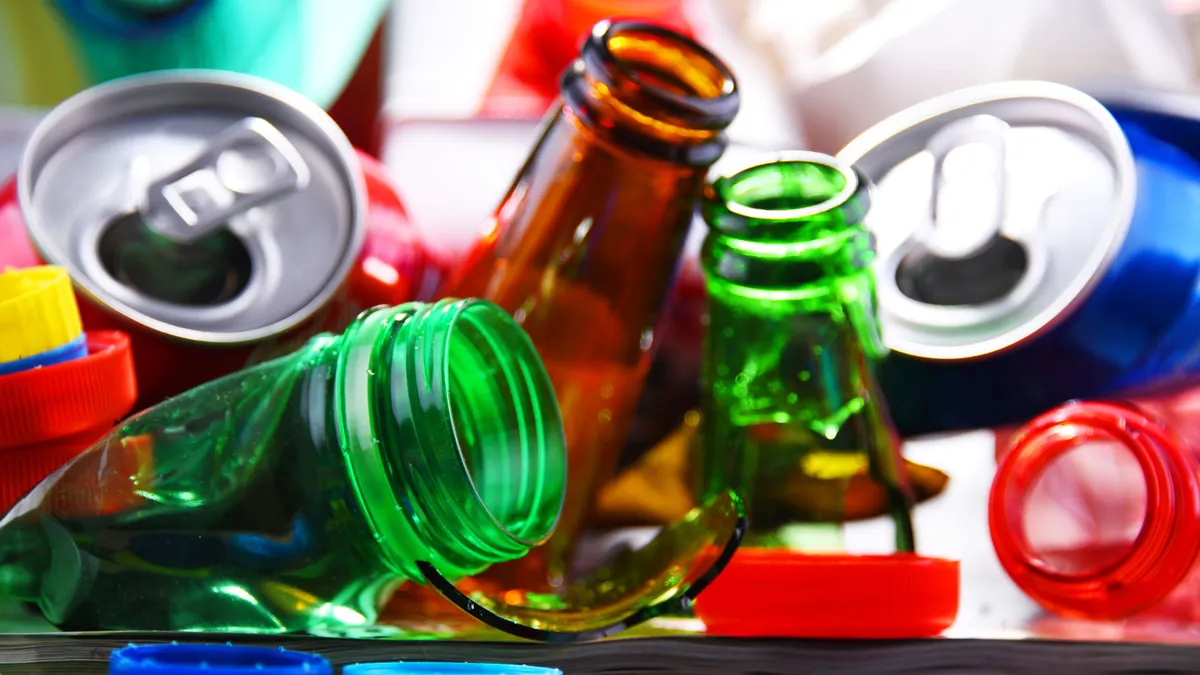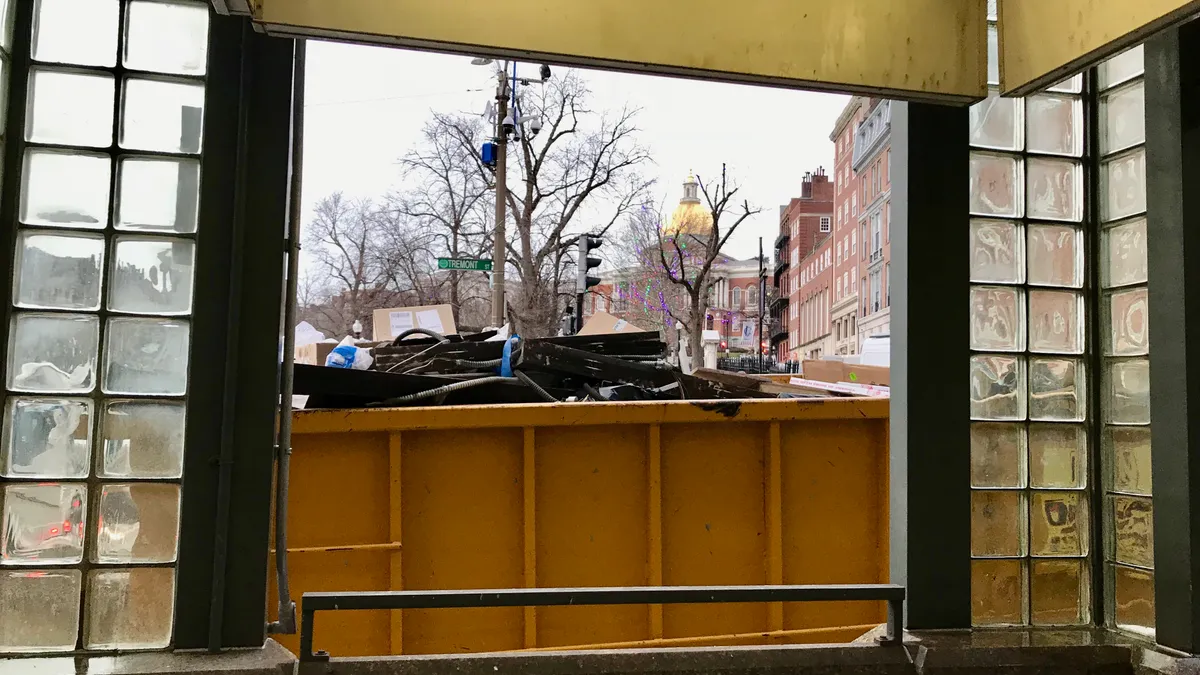Lately, everyone seems to have an opinion on the concept of recycling.
If you somehow only tuned into the last month or so of coverage, you might think it was in pretty bad shape. References to "crisis, "chaos," "collapse," "broken" and other similarly alarming states of entropy are abundant in stories from around the country. If you've been in the industry for a while, the word "recycling" might conjure up different idea. Perhaps it's an act of resource conservation, a step in the industrial manufacturing process, an essential public service, or even a method to encourage greater consumption.
In honor of our new weekly recycling newsletter, Waste Dive is going back to the basics. We asked readers what "recycling" means to them and where they see it heading this year — while also highlighting some of the more common technical, academic and cultural definitions.
What follows isn't meant to be comprehensive, and we'd be glad to consider any additions or suggestions you'd like to share with us at waste.dive.editors@industrydive.com.
Practical Definitions
Parsing the precise meaning of "recycling" is a challenging task — and one that organizations have been grappling with for years, as shown in past reports such as the Institute for Local Self-Reliance's "Cutting the Waste Stream in Half" (1999). Should it include MRF residuals? Bottle bill tonnage? Organics? If the definition is too specific, does it preclude reduction or reuse? Here are a few of the most widely-used definitions:
Institute of Scrap Recycling Industries:
"'Recycling' is a series of activities in which material is processed into specification-grade commodities, and consumed as raw-material feedstock, in lieu of virgin materials, in the manufacture of new products. The series of activities that make up recycling include the collection, processing, brokering and subsequent consumption of industrial, end of life and obsolete scrap, as well as the process of transforming used products, whole or in part, into reusable commodities."
Solid Waste Association of North America:
"[Recycling is] the collection, sorting, marketing, processing, and transforming or remanufacturing of Recyclable Materials into Recycled Materials and Recycled Products, including marketing thereof; and the purchase and use of Recycled Products." (Click here for SWANA's full policy)
“There has been a significant amount of misinformation and hysteria in the media recently about recycling, with one major national newspaper describing it as 'collapsing,' while an Indiana paper had a headline about avoiding recycling 'Armageddon.' ... Recycling is not dying, and China’s import restrictions provide an opportunity to create jobs in North America and protect the environment. We should take full advantage of the opportunity.”

David Biderman
SWANA CEO
National Recycling Coalition:
"Recycling is a series of activities by which material that has reached the end of its current use is processed into material utilized in the production of new products." (Click here for NRC's full policy)
Environmental Protection Agency:
"Recycling is the process of collecting and processing materials that would otherwise be thrown away as trash and turning them into new products. Recycling can benefit your community and the environment."
Academic and Cultural
"Why Do We Recycle?" (1997) by Frank Ackerman:
"Recycling is an impressively pure form of altruism, a widespread commitment to the greater good." / "Participation in recycling is, in addition to its more literal purposes, a ritual of environmental belief."
"Waste and Want" (1999) by Susan Strasser:
"According to the Oxford English Dictionary, recycle originated in the oil industry during the 1920s, describing partially refined petroleum sent through the refining cycle again to reduce waste. Its use broadened during the 1960s, designating all kinds of reuse and reclamation, and the word became familiar during the early 1970s, as the burgeoning environmental movement promoted the separate collection of certain kinds of trash to promote their reuse to manufacturing."
"[W]hat most Americans think of as recycling is actually more akin to harvesting. That is, a home recycler harvests cardboard from trash and other recyclables, and a paper mill recycles that used cardboard into new cardboard. Recycling is what happens after the recycling bin leaves your curb."

Adam Minter
"Junkyard Planet" (2013)
"Reduce, Reuse, Reimagine" (2018) by Beth Porter:
"The purpose of recycling is both to lessen our society's negative impact on the environment, as well as to provide manufacturers with quality materials to generate new products that will bolster our economy."
"The what and the why of Discard Studies" (2018) by Max Liboiron:
"[The China scrap import ban's] disruption of the global recycling market illustrates how waste is made through relations between centers and peripheries and how the coherence of the center is dependent on the periphery. Recycling is able to be understood as a 'green' and morally good recycling practice in Canada, Europe, and the US only through environmental sinks in China. That is, the center is kept clean by externalizing waste to peripheries."
Private Sector
Bob Cappadona, president and COO of Veolia North America:
"While communities struggle to recycle collected materials as a result of commodity market volatility, companies who include their commitment to sustainability in the marketing of their products are leading and developing innovative ways to manage and recycle materials previously destined for landfills. These companies are investing in the circular economy to better address this global issue through collective action and partnerships like The Alliance to End Plastic Waste."
Michael "Recycle" Benedetto, president of TFC Recycling:
"The recycling market is over supplied. We need more demand. Either those that are producing the waste need to step up to support closing the loop or our elected officials need to do something through legislation. We don’t need to go back in time to dual stream or drop off recycling. We may need to reconsider what items we accept in the recycling carts and make sure what we accept is 'paying its way.'"
Len Christopher, COO of Leadpoint:
"I believe that the more material we can divert from landfills, to recycle and reuse, the better. There's only so much space. That's why I got into the recycling industry 22 years ago and it's been my livelihood ever since. The biggest issue right now is contamination in the stream. It makes recycling hard on operators and partially explains why the market for our recycled materials had to stop. We were creating pollution and problems in other countries.
"People want to do the right thing, but we need to educate them on what's recyclable and what's not. That's why I think that in 2019 we'll see more consumer education and more efforts starting at the source, like can audits for example. When consumers come home to find that their recycling bin isn’t emptied and a tag explaining why, people will get the message."
Betina Papadeas, senior scientist at Tetra Tech:
"Recycling is secondary to source reduction and waste prevention. While it is better than landfilling and other options, it has negative environmental impacts associated with the many stages of its transport and processing. With more countries like India following China's lead with waste bans, I see the continued decline of the recycling industry in 2019."
Kevin Haseney, sustainability management professional at JDog Junk Removal & Hauling Tampa:
"Recycling isn’t a blanket term, not nationwide and not even statewide. Some areas have strict programs, recycling certain items very well. Others have more expansive capabilities, while still others haven’t updated technologies or policies in years. Standardizing recycling rules and policies across the country would go a long way toward minimizing confusion and helping more consumers and businesses recycle properly. In the meantime, the industry needs to do a better job making local recycling systems and regulations clear to consumers.
"Recycling is not an easy task for consumers, even outside the non-standardization, and the industry is making it even more complicated without bringing consumers up to speed. For instance, there are more green and eco-friendly product labels than ever before, but consumers are misreading them. A symbol indicating an item was made from recyclable materials doesn’t also indicate the item is recyclable, but consumers might still put it in a curbside bin. With product labels now categorizing everything from 'repurposed' to 'compostable' items, consumers need a better understanding of recycling — and they need to start thinking beyond blue bins."
Public Sector & Everyone Else
Keefe Harrison, CEO of The Recycling Partnership:
"While it’s important to recognize that recycling continues to face market fluctuations and that many local recycling programs have room for improvement, recycling is also a highly valued public service.
"We encourage everyone to stop thinking of recycling as a thing with a designated national and international day to celebrate. It's a complex, loosely connected, highly resilient system that generated $117 billion in economic activity and $13.2 billion in tax revenue in 2017. The recycling industry employs 156,000 men and women nationwide. It also is an increasingly important provider of valuable, energy-efficient materials to manufacturers worldwide." (Click here for Harrison's full March 18 blog post)
Rachel Brandon, staff analyst for Department of Public Works in Fresno County, California:
"Recycling means many things to Fresno County Resources Division and me. It means reducing the amount of solid waste going to the landfill and meeting California state mandates for solid waste reduction and increasing diversion of wastes to recycling ... Effective recycling means taking responsibility for our own recyclable waste instead of shipping it to foreign countries, and developing the infrastructure and business climate that encourages manufacturers to use and sell products made from recycled plastics and other materials. It means closing the loop and creating a circular economy for these products."
Kathleen Hayden, member of Bexley, Ohio's Environmental Sustainability Advisory Council:
"To me, recycling is about being mindful of correct recycling and thinking about what kinds of items to purchase. I know what is accepted in my municipality and try hard to not purchase packaging that I know cannot be picked up in my curbside recycling."
"Recycling means capturing materials that would otherwise go to waste in order to save natural resources and the energy that it used to extract and transform natural resources into finished products."

Michael Rieser
Recycling outreach coordinator, GrowNYC
Amy Hammes, recycling specialist at Burbank Recycle Center in California:
"We have to start treating the cancer patient as if they have cancer – not avoid the tumor because it’s too hard to deal with. Our need for “cheap” convenience at all costs is really costing us and will continue to cause more problems. Product manufacturers and government legislation needs to focus on producer responsibility and market development for products. Solve the 'buyer' problem on commodities for lack of demand, and you have solved most of recycling's woes. But keep in mind, recycling is not the cure-all for materials like plastics as they are downcycled and eventually will have a final end of life…or create other environmental headaches like plastic fibers from textiles leeching into our water when washed. The focus should be if manufacturers don’t want to use recycled content to truly support and stabilize recycling markets, then they should be focused on creating more durable goods and take back programs.”
Karen Hultgren, solid waste recycling analyst at Pierce County Planning and Public Works in Washington:
"'Recycling' to me means only collecting materials that have stable, reliable markets so the collected items ultimately get made into new products. Do markets go up and down, of course! But some sort of end user/buyer remains."
Alex Truelove, zero waste director at USPIRG:
"Over time, producers have produced cheaper and cheaper forms of disposable plastic, which is great for their bottom line but terrible for recycling because those items can’t be profitably turned into something new.
Perhaps the truth shouldn’t surprise us. How can we expect things that were designed to be used for a few minutes — yogurt containers, plastic bags, foam cups, straws — to hold value? That's not to say that we should give up on recycling as an ethos, but we need to recognize that cheap, disposable plastics need to be replaced with more durable and reusable options." (Click here for full March 18 Medium post)
Louise Mann, Waste Reduction Resources:
"Recycling is not incineration or making fuel pellets or using glass as daily landfill cover. These are all examples of downcycling. Recycling is when a collected material is made into something new and re-enters the economic loop multiple times. Don't be fooled, if you care about preserving restoring planet Earth for future generations!"



















